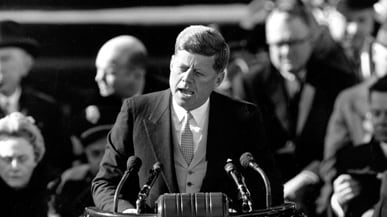Appearances can deceive. We picture John F. Kennedy's inauguration, 50 years ago this week, through a warm haze of nostalgia and regret. How romantic it seems now, how far away, and how unlike our own dreary time. Washington must have been Camelot then, or so the myth makers tell us, and so we wish to believe.
But if, on that brilliant January morning in 1961, Kennedy believed that he was at the beginning of a golden age, he didn't feel that way for long. Less than three months after his inaugural, he blundered into the Bay of Pigs, launching a CIA army of Cuban exiles in a harebrained attempt to overthrow Fidel Castro. When the emigres were pushed into the sea, the young, new, and untested president was seen crying in the Rose Garden before dawn. Less than three months after that, he was bullied by Soviet Premier Nikita Khrushchev at the Geneva summit, and the Cold War entered its most dangerous phase.
Gallery: Anniversary of JFK's Inauguration

Kennedy learned from his mistakes. After the Bay of Pigs fiasco he told reporters that though "victory has a thousand fathers" and "defeat is an orphan," he was personally responsible. (His approval ratings actually shot up.) By 1963, he had survived the Cuban Missile Crisis and was steering the superpowers towards detente. As he prepares for his third year and his second State of the Union Address, Barack Obama can learn, too. He can look to the example of President Kennedy. The lesson is not to give pretty speeches. We have too many would-be Ted Sorensens, young speech writers trying to recapture the rhythms and lofty rhetoric of Kennedy's wordsmith. Sorensen actually did not write the most memorable exhortation in Kennedy's inaugural, "Ask not what your country can do for you—ask what you can do for your country."
As historian Thurston Clarke has shown, Kennedy probably first heard a variation, spoken by his prep school headmaster, Seymour St. John: "Ask not what Choate can do for you, ask what you can do for Choate." St. John, in turn, was probably borrowing from Cicero: "You should do something for your country once in a while instead of always thinking about what your country can do for you." It has long been an article of faith that great nations cannot survive unless their citizens are willing to sacrifice for the country, not just in battle but in everyday life.
It is a sentiment that seems largely lost now. Obama came to office at the tail end of the Age of Free Lunch, which was crashing along with all those no-money-down mortgages in 2008 and 2009. To rescue the nation from crushing debt, the president will have to find a way to ask citizens to sacrifice in very unpopular ways, by receiving fewer benefits and paying more taxes.
At the same time, he needs to think hard about how he can relieve the burden on the one group that really does sacrifice, the U.S. military. The model here is not John F. Kennedy—whose hubristic vow in his Inaugural Address that the United States would "pay any price, bear any burden" helped lead straight into Vietnam. Rather, President Obama could study the example of the old man sitting, bundled against the winter cold, on the podium just to the side of the tanned and vibrant young JFK.
President Dwight Eisenhower was regarded as a worn-out old soldier when he turned over the presidency to JFK in 1961. But he, too, gave a famous speech we celebrate this month—the 50th anniversary of his Farewell Address warning of the dangers of the "military industrial complex." Ike guided with a "hidden hand", writes Princeton political scientist Fred Greenstein. "God help the nation when it has a president who doesn't know as much about the military as I do," Ike told his aide, General Andrew Goodpaster. Ike was able to keep his generals in check—after he extricated U.S forces from Korea in 1953, he kept the country out of war for his entire eight years. As Obama ponders what to do about Afghanistan, he might consider Eisenhower's leadership example. Ike had an uninspiring speaking style and his syntax was sometimes garbled at press conferences. But he knew how to get people to do what they didn't always want to do.
Evan Thomas has been editor at large of Newsweek since September 2006.






